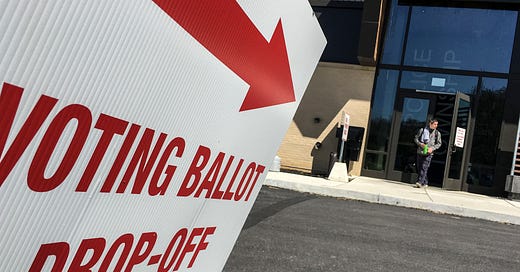U.S. Supreme Court puts rejected ballots from 2021 judicial race back in play
But candidate David Ritter says he can take case to Supreme Court again.

Disputed ballots from a 2021 Lehigh County judicial election can be counted after all, according to the ACLU which represented five voters in a case that reached the U.S. Supreme Court.
The Supreme Court Thursday afternoon declined to hear a request by candidate David Ritter, who argued that 257 mail-in ballots were not dated on the outer envelope as required by state law and therefore should not be counted.
“This is a great victory for the ACLU and for the voters,” ACLU spokesman Andy Hoover said.
But Ritter, an Allentown lawyer, said much uncertainty still surrounds his case and that it may be premature to claim victory.
He said he still can ask the Supreme Court to hear the merits of his case by filing a formal appeal of a lower court’s decision. That May 20 decision by the Third Circuit Court of Appeals, said the disputed ballots should be counted.
“The stay was ended but the issue (of counting undated ballots) has never been heard by the Supreme Court,” Ritter said.
The issue before the Supreme Court was limited in scope — whether a temporary hold, known as a stay, on counting the ballots should remain. On May 31, Justice Samuel Alito ordered the stay pending further review. But the court, in a 6-3 vote, rejected Ritter’s request.
The six justices in the majority did not explain their decision. Alito, with Justices Clarence Thomas and Neil Gorsuch joining him, wrote a dissenting opinion.
He said the issue of undated ballots must be decided before Pennsylvania conducts its elections in November.
“I would agree with that decision [to count the votes] were it not for concern about the effect that the Third Circuit’s interpretation of [the state’s mail-in voting law] may have in the federal and state elections that will be held in Pennsylvania in November,” Alito wrote.
He added that the court could hear an appeal from Ritter when its term begins in October and reach a decision before the election.
Ari Savitzky, senior staff attorney with the ACLU’s Voting Rights Project and who represented the voters in their lawsuit, said it’s time to count the votes.
“Every vote matters, and every valid vote should be counted,” he said in a statement. “Voters may not be disenfranchised for a minor paperwork error like this one. The Third Circuit was correct in unanimously reaching that conclusion. We are thrilled for these voters that their ballots can finally now be counted, consistent with the requirements of federal law.”
Tuesday’s decision is just the latest development in a seven-month legal drama that saw the case proceed from county to state and then federal courts.
At issue are 257 mail-in ballots in Lehigh County that did not contain the required handwritten date on the outer envelopes returned to the county. Ritter, a Republican, led Democrat Zachary Cohen by 71 votes for the third and final seat on the county court. Democrats tend to use mail-in ballots much more than Republicans and it’s possible Cohen could overtake Ritter by counting the other ballots and be seated on the court.
Ritter’s legal team acknowledged that possibility in one of its briefs filed with the Supreme Court: “[T]he Third Circuit has ordered Lehigh County to count over 250 undated ballots — enough to eliminate David Ritter’s lead three times over.”
Because of the court challenges, Lehigh County has yet to publish the official, certified results in the 2021 election, which involved dozens of contests for county offices, school boards and municipal government positions.
The county Board of Elections was prepared to count those ballots after the November 2021 election, but Ritter attempted to block that count from occurring. He sued and lost in county court, where Judge Edward Reibman determined the ballots should be counted. Ritter won an appeal before the Pennsylvania Commonwealth Court. Cohen then appealed to the Pennsylvania Supreme Court, which opted against hearing the case.
That prompted the ACLU, on behalf of five voters — Linda Miglori, Francis J. Fox, Richard E. Richards, Kenneth Ringer and Sergio Rivas — to file a federal lawsuit against Lehigh County in January. In March, Judge Joseph F. Leeson Jr. of the Eastern District of Pennsylvania determined the ballots should not be counted.
The ACLU then took the case to the federal appeals court, saying that not counting the 257 ballots for such a minor oversight disenfranchised voters and violated the Civil Rights Act. The court agreed.
“Ignoring ballots because the outer envelope was undated, even though the ballot was indisputably received before the deadline for voting serves no purpose other than disenfranchising otherwise qualified voters,” the court’s opinion said. “This is exactly the type of disenfranchisement that Congress sought to prevent.”
Another recent case before the U.S. District Court of Eastern Pennsylvania involves a similar argument as to why more than 260 uncounted mail-in ballots in Lehigh and Northampton counties from the May 17 primary should be counted.
Those ballots were rejected because they lacked secrecy envelopes or arrived after the 8 p.m. May 17 deadline. Nine voters who live in the 14th Senate District asked the court to temporarily halt certification of the primary elections in both counties.
Northampton and Lehigh counties have agreed not certify the results in the 14th Senate District the outcome of litigation, according to an order issued by Judge John M. Gallagher.
Supporting the lawsuit is Tara Zrinski, who is 42 votes behind Nick Miller, an Allentown School Board member, in the Democratic primary in the 14th District’s state Senate seat. Zrinski, a Northampton County commissioner, earlier told Armchair Lehigh Valley that she has yet to concede the race. Miller has claimed victory but Zrinski has yet to concede.




